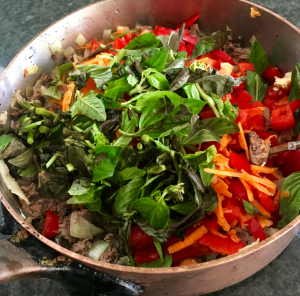Our red and white blood cells have many important roles in cancer treatment, and if your nutritional health suffers, this can reduce the ability of the body to produce enough blood cells to allow the body to cope with treatments.
Specifically, lack of red blood cells (anaemia), reduces the body’s capacity to carry oxygen from the lungs around the body, which can contribute to fatigue and shortness of breath. This also means there is a reduced amount of oxygen circulating in the body which affects the function of all body cells and tissues.
The white blood cells are the body’s soldiers or defence forces and are key in helping to fight and recover from infections and other internal insults. This is also why if you find that white blood cell counts such as neutrophils are low, then you will be at a high risk of infection and will be started on antibiotics and told to keep out of public places and eat a low microbial diet.
Immunity – ability to fight infections
Around a third of our nutritional intake is used to help keep our immune system functioning. The immune system works at many levels in the body, and its capacity depends on enough nutrition to ensure breakdowns are minimised. One of the main ways that poor nutrition can affect this is thinning of key barriers such as the skin and the lining of the digestive tract, as mentioned above. Furthermore, it can cause a significant reduction in body proteins and the specific bacteria fighting cells such as the white blood cells, which means we are less able to fight cancer.

Cell repair and treatment recovery
During cancer treatment, the body is working overtime to try to heal and to rebuild the damage done to the healthy tissues and cells. If the body is not well nourished, this healing process can be slow as the extra nutrients needed are in short supply. If you are having chemotherapy and your blood counts do not recover between treatments, then treatments doses may need to be reduced or delayed. This may affect your treatment response.
Evidence shows that people who are well nourished are able to heal and recover faster than those who are nutritionally compromised. Hospital stays are also normally shorter and associated with fewer complications in people who are stronger and well nourished.
Muscle loss and strength
If you are not eating enough to maintain your weight and meet your increased protein requirements, the body takes on a rationing approach to the fuel supplies it is able to access. It is a bit like if there is a petrol strike and limits are placed on the days and amounts you can buy petrol.
The bottom line is that our body uses up quite a bit of fuel. This fuel keeps the essentials going, such as the brain which uses a staggering amount – around a quarter of the food energy we consume. Fuel is also need for the pumping efforts involved in keeping our heart and lungs functioning, as well as the liver, the kidneys and other major organs. If a fuel shortage threatens, though, the body’s management systems start to make tough rationing decisions. If there is not enough fuel coming in for all parts to work well, then it must ration what it has to the vital organs and slow down the supplies to the ‘nice-to-haves’ or the non-essential activities.
This includes having energy to engage in extra activity, feeling good, having the brain power to think clearly, and muscle power and strength, among others.
The other big challenge here is that the body needs a constant supply of glucose to enable the brain and these other vital body organs in order to keep functioning. So, if you are not taking in enough food, it must break down muscle and fat stores to top up supplies. As the majority of the body’s protein stores are in the form of muscles, this breaking down process incurs definite losses which affect tone and strength. And, as the arms and legs are not the only stores of muscle, muscle stores are also drained from within the heart, lungs, digestive tract and immune system.
Think for example of the main role of the heart and lungs, to enable us to breathe in oxygen and then pump it around the body. When muscle is lost from the heart and lungs, these essential processes can also be affected. This means it takes the body much more effort to breathe in and move sufficient oxygen around the body. It is also slower to rid the body of waste products including carbon dioxide. This can have a big effect on your stamina and energy levels.
Psychological impacts
The psychological impact of cancer can be enormous. One of the most difficult areas for people during cancer treatment can be the effects a loss of appetite or change in shape on their social life and how they feel about themselves. A change in appearance – depending on whether they have lost or gained a lot of weight – tends to make people feel very self-conscious, and it is a common reaction to want to hide away or to disguise yourself in unflattering clothes. The way you appear to yourself and other can also be a constant reminder of illness. Many people find it very hard to deal with this.
At times, due to the nature of this illness, such changes are almost unavoidable. However, I do hope that such reminders help you realize again the importance of keeping track of your nutritional health, and of finding practical ways in which you may limit the impact of cancer and its treatment. As I’ve said before, this doesn’t always have to involve huge changes or a superhuman quest. Investing in the effort to nibble when you are not feeling hungry, or adjusting some of the usual ways you eat, are small things that you can do for yourself. Such changes may make a big difference in your treatment outcome, and also give you more confidence, help you maintain energy, boost your concentration, and enable you to keep enjoying the life you want. So, if you do look in the mirror and feel discouraged, sad or distraught, bear in mind that while this is a natural reaction, there are also ways you can take action to change things.




